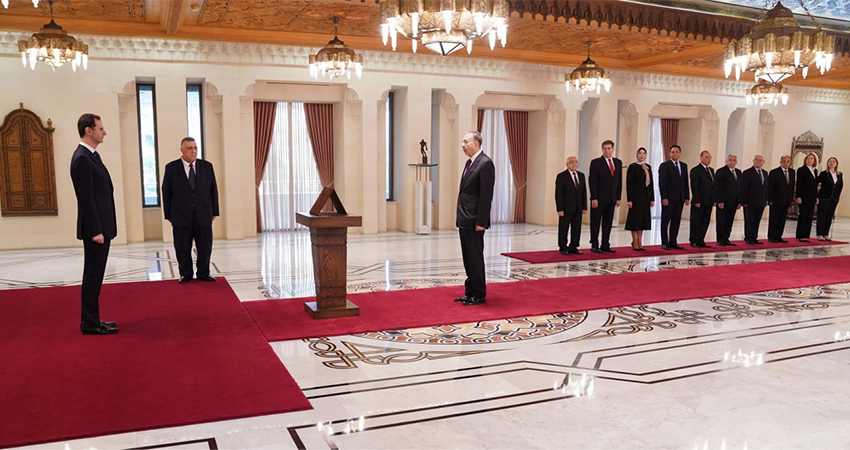Introduction
On May 16, 2022, the Syrian President Bashar Al Assad issued the Decree No. 127 of 2022 stipulating the renomination of the head of the Syrian Supreme Constitutional Court with six other members of the court’s plenary board, in addition to appointing four new members.
The number of the Supreme Court Members became 11 after the decree. The last nomination decree for members of the Supreme Constitutional Court, Decree no 165, was issued more than four years ago on May 8, 2018.
Members of the Syrian Supreme Constitutional Court include well-known such as Muhammad Jihad Allaham, a lawyer who was reappointed as the president of the court after renewing his mandate per decree 127 article no 1.
Other renominated members, per Decree 127 article No. 2, are Judge Raslan Ali Tarabulsi, Judge Malik Kamal Sharaf, Professor Jamilah Muslim Al Sharbaji[1], Professor Said Abd Alwahed Nhili[2] (the last two are also members of the present “Syrian Constitutional Committee” held in Geneva), Lawyer Majid Rashid Khdera and Lawyer Mutasem Skeker.
Article No. 3 of the Decree 127 stipulated the nomination of new Supreme Court members,Judge Fares Mulhem Sattouf (the President of the Court of Cassation since 2020), Judge Dibo Abd Al Salam Shihadah, Judge Maisaa Anwar Al Mahrous, and Judge Wisam Badii Yazbek.
The decree for the formation of the Supreme Constitutional Court appears to consider the balance of quorum in relation to the numbers of appointed lawyers and judges, to avoid the ongoing tensions between the bar association and the ministry of justice which sometimes emerges through the course of work in courts and during the Annual General Conference of Attorneys in Syria, led by the Minister of Justice.
With these amendments, the present Supreme Constitutional Court now includes six judges, three lawyers (including the president of the court), and two academic members from faculties of law in Syrian Universities.
Formal Independence of the Supreme Constitutional Court
Theoretically, the Supreme Constitutional Court is an “independent judicial body”, as stipulated in Article 140 of the Syrian Constitution in force (2012 Constitution), that also set a minimum of seven members of the Supreme Constitutional Court without clearly indicating the maximum number of members.
Later, the independence of the constitutional court from other powers was highlighted in the Supreme Constitutional Court Act no 7 of 2014, Article No. 1”. Article No. 3 of the same act stipulates the maximum number of the Supreme Constitutional Court plenary board is eleven members including the president, all nominated by the president of the republic with a decree for a renewable four-year term (with undefined number of renewals), per “paragraph a”, and here lies the first problem related to the independence of the court.
Members of the Supreme Constitutional Court nominated by the president will execute his orders in order to keep their positions for the longest term possible and will likely never contradict the will of the Head of the Executive out of fear of dismissal or removal.
Meanwhile, the president of the Supreme Constitutional Court and its members take an oath before the President [3], in the presence of the president of the parliament. In case of a vacant position/ expired term of one of the court members due to death, resignation, or impeachment, the President nominates a substitute for a term not exceeding the remaining term of his/ her predecessor, per law No. 7, Article 54:
“The President nominates by a decree a president or a member as a substitute for the impeached, resigned, or dead member for a term not exceeding the remaining term of his/ her predecessor.”
We can conclude that:
First, the nomination mechanism for members of the Syrian Supreme Constitutional Court violates the principle of the separation of powers with the definitie encroachment by the
Head of the Executive Branch (the President)on judicial power. This encroachment violates the current constitution, passed in 2012, per Article 140, which stipulates that “the Supreme constitutional Court is an independent judicial body”. This encroachment also breaches the Supreme Constitutional Court Act that stipulates in Article No. 1 that “the Supreme Constitutional Court is an independent judicial body in the Syrian Arab Republic based in Damascus.”
Second, the absolute power given to Head of the Executive (the President) to nominate members of the Supreme Constitutional Court, in fact turns court members to administrative officers and not members of an independent judicial body, per Article 141 of the 2012 constitution and Article 3/ paragraph (a) of the Constitutional Court Act. Therefore, those members are vulnerable to impeachment at any time without any parameters or standards to guarantee an independent decision-making process.Third, in case of a vacant position/ expired term of one of the Constitutional Court members due to death, resignation, or impeachment, the President nominates a substitute for a term not exceeding the remaining term of his/ her predecessor per law No. 7, Article 54:
“The President nominates by a decree a president or a member as a substitute for the impeached, resigned or dead member for a term not exceeding the remaining term of his/ her predecessor.”
Although Act No. 7 of 2014 tried to create a smokescreen by giving most of the court’s plenary board the authority of impeachment (Article 53), the President and intelligence bodies are still able to suggest to other members to impeach the members they do not want, and other members will not hesitate to do so to guarantee their positions for the next term of mandate. Above all, it is inconceivable in Syria that any member to oppose the President, because the latter nominates only those approved by his allying intelligence services, who live in Syria outside the law or even above the law.
To read the report in full as a PDF, follow this link.

